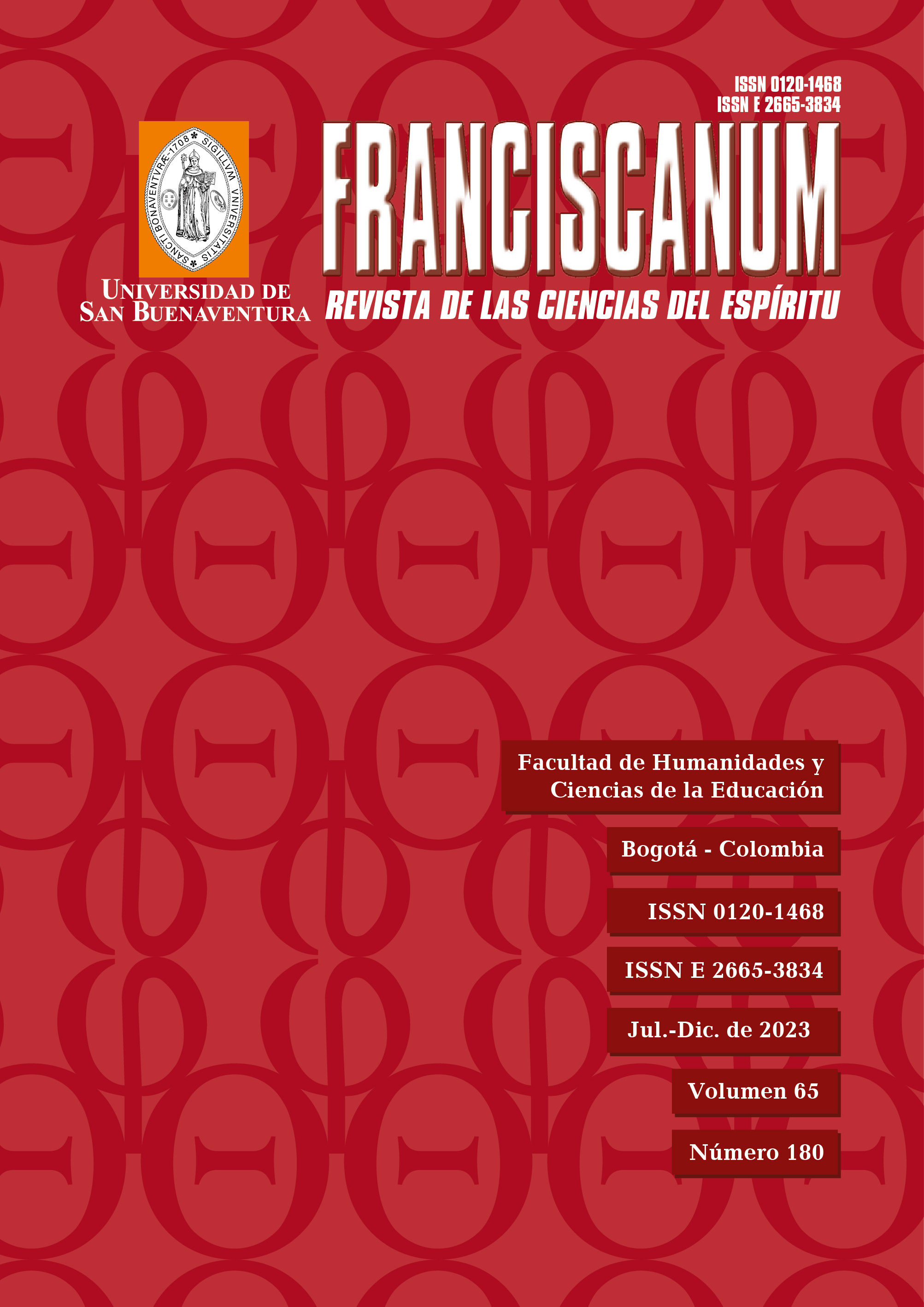This journal provides immediate open access to its content, based on the principle that giving the public free access to research helps a greater global exchange of knowledge.
Therefore, the Creative Commons 4.0 Attribution Attribution - Equal Share (by-sa) License is accepted: The commercial use of the work and the possible derived works is permitted, the distribution of which must be done with a license equal to that regulates the original work.
http://creativecommons.org/licenses/by-sa/4.0/
Along these same lines and in line with the Open Access policy, it is clarified that the authors maintain their rights to articles, without restrictions and, in the same way, they maintain their publication rights, without restrictions. They are only asked to reference the number of the Franciscanum magazine where the article initially appeared.
Abstract
Abstract: in this article, we want to show how good, truth and beauty, because they are properties that are identified with being, that is, transcendentals, reveal some characteristics of the perfect being in imperfect entities. This is possible in the thought of Thomas Aquinas, because God, who is the one who creates, in doing so transmits something of his own being to his work; just as the artist reflects himself in some respect in his work.
In the case of God, this reflection is called vestige, and has an analog character. However, it allows a rational incarnated creature to discover Him through the contemplation of the universe, which transforms creation into a hierophanic phenomenon.
References
Aertsen, Jan A. «Filosofía cristiana ¿Primacía del ser versus primacía del bien?». Anuario Filosófico 33, n.° 2 (2000): 339-361.
Aertsen, Jan A. La filosofía medieval y los trascendentales. Un estudio sobre Tomás de Aquino. Pamplona: Eunsa, 2003.
Cresta, Gerald. «La sistematización de los trascendentales del ser en su desarrollo histórico». Acta Scientiarum 38, n.° 4 (2016): 347-374.
Fabro, Cornelio. Introducción al tomismo. Madrid: Rialp, 1967.
Forment, Eudaldo. «La sistematización de Santo Tomás de los trascendentales». Contrastes. Revista Interdisciplinar de Filosofía, Universidad de Málaga 1 (1996): 107-124.
Forment, Eudaldo. «La trascendentalidad de la belleza». Thémata. Revista de Filosofía, n.° 9 (1992): 165-182.
García López, Jesús. Introducción a El bien, de Tomás de Aquino. Navarra: Cuadernos de Anuario Filosófico. Serie Universitaria Núm. 27, 1996.
García López, Jesús. Metafísica tomista. Ontología, Gnoseología y Teología natural. Pamplona: Ediciones Universidad de Navarra, 2001.
Gilson, Étienne. El espíritu de la filosofía medieval, Buenos Aires: Emecé Editores, S.A., 1952.
Gilson, Étienne. Pintura y realidad, Traducción del inglés de Manuel Fuentes Senot, Madrid: Aguilar, 1961.
González Álvarez, Ángel. Tratado de metafísica. Ontología, Madrid: Editorial Gredos, 1968.
Lira, Osvaldo. El misterio de la poesía: el poeta. Tomo I. Santiago: Ediciones Nueva Universidad, 1974.
Lobato, Abelardo, «El horizonte estético del hombre medieval», Revista Española de Filosofía Medieval, Universidad de Córdoba, Facultad de Filosofía y Letras, Vol. 6, (1999): 57-68.
Lobato, Abelardo. Ser y belleza. Barcelona: Editorial Herder, 1965.
Martínez, Enrique, «Bonum amatur inquantum est communicabile amanti. Amor y bien en la metafísica de Santo Tomás de Aquino». Espíritu: cuadernos del Instituto Filosófico de Balmesiana 61, n.° 143 (2012): 73-93.
Millán Puelles, Antonio. El interés por la verdad. Madrid: Ediciones Rialp, 1997.
Navarro Cordón, Juan Manuel. «Ser y trascendentalidad. Un estudio en Tomás de Aquino». Logos: Anales del Seminario de Metafísica 19 (1984): 11-62.
Pieper, Josef. El descubrimiento de la realidad. Madrid: Rialp, 1974.
Reinhardt, Elisabeth. La dignidad del hombre en cuanto imagen de Dios. Pamplona: Eunsa, Ediciones Universidad de Navarra, 2005.
Rodríguez Luño, Ángel. Ética General. Pamplona: Eunsa, 2014.
Tabossi, Gabino. «El conocimiento del bien por connaturalidad afectiva. El dinamismo integral de la prudencia en la IIae-IIae de la Suma Teológica de Santo Tomás de Aquino». Revista Teología 53, n.° 120 (2016): 100-120.
Tomás de Aquino. Cuestiones disputadas sobre la verdad, Traducción y citas textuales de Antonio Osuna Fernández-Largo, 1.a edición. Buenos Aires: Agape Libros, 2007.
Tomás de Aquino. Cuestiones disputadas sobre la verdad. Editor Ángel Luis González, Traductor Jesús García López et al., Tomo I. Pamplona: Eunsa, 2016.
Tomás de Aquino. De Veritate. Traducción y citas textuales de Antonio Osuna Fernández-Largo, 1ra edición. Buenos Aires: Agape Libros, 2007
Tomás de Aquino. Suma Teológica. Madrid: Biblioteca de Autores Cristianos, 2010.
Tomás de Aquino. Suma Contra los Gentiles. Madrid: Biblioteca de Autores Cristianos, 2010.



















